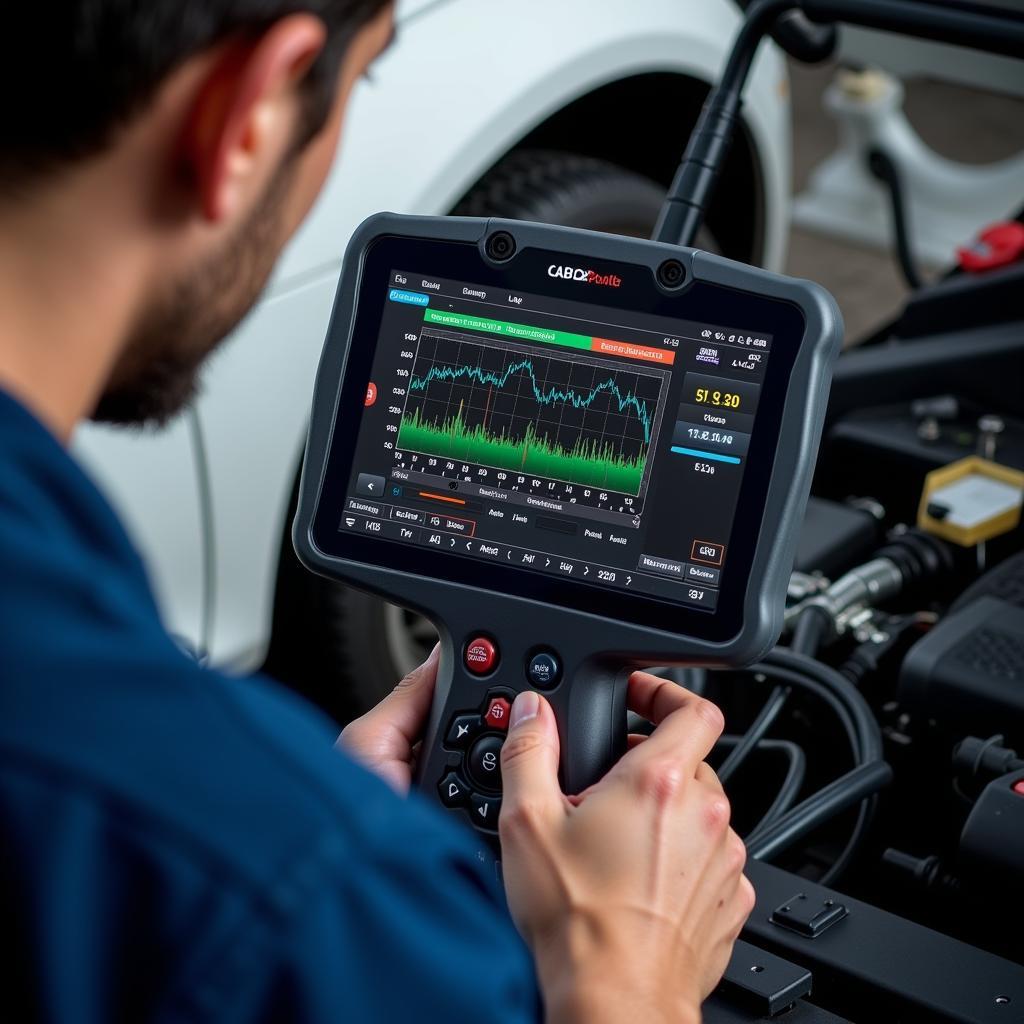Modern vehicles are complex machines, with intricate systems and countless components working in unison. When a problem arises, identifying the root cause can feel like searching for a needle in a haystack. That’s where Car Fault Diagnostic Tools come in, revolutionizing the way we troubleshoot and repair vehicles. These powerful tools act as a window into your car’s computer system, translating complex codes and data into understandable insights.
This comprehensive guide delves into the world of car fault diagnostic tools, exploring their types, functionalities, benefits, and how they empower both car owners and professionals to diagnose and resolve car issues efficiently.
Types of Car Fault Diagnostic Tools: From Basic to Professional
Car fault diagnostic tools come in a range of complexities and functionalities to cater to different user needs and budgets.
1. Code Readers: Your Pocket-Sized Diagnostic Companion
For car owners seeking basic diagnostic capabilities, OBD2 code readers are an excellent starting point. These compact, affordable devices plug into your car’s OBD2 port, typically located under the dashboard, and can retrieve and display generic fault codes stored in your car’s computer. While they might not provide in-depth information about the cause of the fault, code readers offer a quick and easy way to understand what’s triggering that pesky check engine light.
2. OBD2 Scanners: Delving Deeper into Diagnostics
 OBD2 Scanner in Use
OBD2 Scanner in Use
Taking a step further, OBD2 scanners provide a more comprehensive diagnostic experience. These tools not only read and clear generic fault codes but also offer access to manufacturer-specific codes, live data streams from various sensors, and historical data logs. This wealth of information allows you to monitor your car’s performance in real-time, identify intermittent issues, and gain deeper insights into the health of your vehicle.
3. Professional Diagnostic Scanners: The Go-To for Mechanics and Experts
Professional diagnostic scanners are the pinnacle of car fault diagnostic technology. These sophisticated tools offer the most extensive range of features, including advanced coding and programming capabilities, bi-directional control over vehicle systems, and access to detailed technical information and wiring diagrams. Designed for professional mechanics and automotive specialists, these scanners are essential for complex diagnostics, module programming, and intricate repair procedures.
The Power of Diagnostics: Benefits of Using Car Fault Diagnostic Tools
Investing in a car fault diagnostic tool, whether you’re a car enthusiast or a seasoned mechanic, offers a myriad of benefits:
- Early Problem Detection: Regular use of diagnostic tools can help you identify minor issues before they escalate into major, costly repairs.
- Cost Savings: By pinpointing the exact cause of a problem, you can avoid unnecessary repairs and expensive guesswork.
- Increased Control: Understanding your car’s health empowers you to make informed decisions about maintenance and repairs.
- Enhanced Performance: By monitoring live data and adjusting settings, you can optimize your car’s performance and fuel efficiency.
- DIY Repairs: For the mechanically inclined, diagnostic tools open doors for conducting your own repairs and maintenance tasks.
Choosing the Right Car Fault Diagnostic Tool: Finding Your Perfect Fit
With a wide array of options available, selecting the right car fault diagnostic tool depends on your individual needs and expertise.
For casual users: Basic OBD2 code readers offer a budget-friendly solution for reading and clearing check engine lights.
For DIY enthusiasts: OBD2 scanners provide the additional functionality needed for more in-depth diagnostics and live data monitoring.
For professional mechanics: Professional diagnostic scanners are indispensable for comprehensive diagnostics, advanced programming, and complex repair procedures.
FAQs: Common Questions About Car Fault Diagnostic Tools
1. Can I use any diagnostic tool on my car?
While most cars manufactured after 1996 are equipped with the standard OBD2 port, the specific protocols and functionalities supported can vary. It’s crucial to choose a tool compatible with your car’s make, model, and year.
2. Will using a diagnostic tool void my car’s warranty?
No, using a car fault diagnostic tool will not void your car’s warranty. These tools simply read data from your car’s computer system and do not alter any settings that would affect the warranty.
3. Are car fault diagnostic tools difficult to use?
Modern diagnostic tools are becoming increasingly user-friendly, even for those with limited technical expertise. Many tools feature intuitive interfaces, clear instructions, and helpful resources.
4. Can I use a diagnostic tool to program new keys or modules?
While some advanced OBD2 scanners offer limited programming capabilities, professional-grade diagnostic scanners are typically required for programming new keys, modules, or making significant modifications to your car’s computer system.
5. What should I do if my diagnostic tool can’t resolve the issue?
Car fault diagnostic tools are powerful aids in diagnosing problems, but they are not a substitute for the expertise of a qualified mechanic. If you’re facing persistent or complex car problems, it’s always best to consult a professional.
Need Help with Car Diagnostics? We’re Here to Assist!
DiagFixPro is your trusted source for all things related to car diagnostics. We provide a wealth of information, resources, and expert advice to help you understand your car’s health and make informed decisions about repairs and maintenance.
For personalized assistance or to schedule a diagnostic appointment, please don’t hesitate to contact us via WhatsApp at +1(641)206-8880 or email us at [email protected]. Our dedicated team of automotive specialists is available 24/7 to provide you with the support you need.
Explore More Diagnostic Resources on DiagFixPro:
- Learn about BMW Carly diagnostics and how they can benefit your BMW vehicle.
- Find reliable car diagnostics on Rochdale Rd Oldham.
- Understand the factors that influence car mechanic diagnostic fees.
- Discover the benefits of mobile car diagnostics, including DPF regeneration services.
- Locate reputable diagnostic car repair garages near you.

Leave a Reply